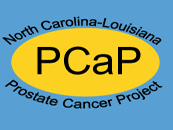PCaP Home
Introduction
Welcome to the official website of the North Carolina-Louisiana Prostate Cancer Project. Prostate cancer is the most common cancer in men and the second leading cause of cancer mortality. In men younger than 65 years of age, the prostate cancer mortality rate for African Americans is 3.1 times that of Caucasian Americans. In men 65 years of age and older, the prostate cancer mortality rate for African Americans is 2.3 times that of Caucasian Americans.
Geographic differences in aggressive prostate cancer within racial groups and differences in mortality rates between North Carolina and Louisiana were the driving factors behind the development of PCaP. PCaP is a multidisciplinary population-based case-only study designed to address racial differences in prostate cancer through a comprehensive evaluation of social, individual and tumor level influences on prostate cancer aggressiveness. At baseline, PCaP enrolled approximately equal numbers of African Americans and Caucasian Americans with newly-diagnosed prostate cancer from Louisiana and North Carolina (2,258 total). In addition to PCaP baseline enrollment, several follow-up studies have been undertaken. For more details of PCaP, click here (PCaP).
The questions the PCaP study addresses are:
- Does access to health care and its quality affect the severity of prostate cancer?
- Do individual factors like diet, exercise, genes and body weight affect the severity of prostate cancer?
- Are prostate tumors in men with severe cancer different from other prostate tumors?
- Do any (or all) of these factors help explain why African American men are more likely to die of prostate cancer than Caucasian American men?
| Name | PCaP | HCaP–NC | Q-PCaP | Financial Toxicity |
|---|---|---|---|---|
| Timeline | 2004-2009 | 4-6 Years of follow up | 10-15 years of follow up | |
| Funding | Department of Defense | American Cancer Society (ACS) | National Institute of Health (NIH) National Cancer Institute (NCI) R15 |
Department of Defense |
| Sample | 2,258 PCa participants | 805 PCa participants |
~900 PCa participants |
Recontact of participants is ongoing |
| Location/Sites | North Carolina & Louisiana |
North Carolina | Louisiana | North Carolina & Louisiana |




